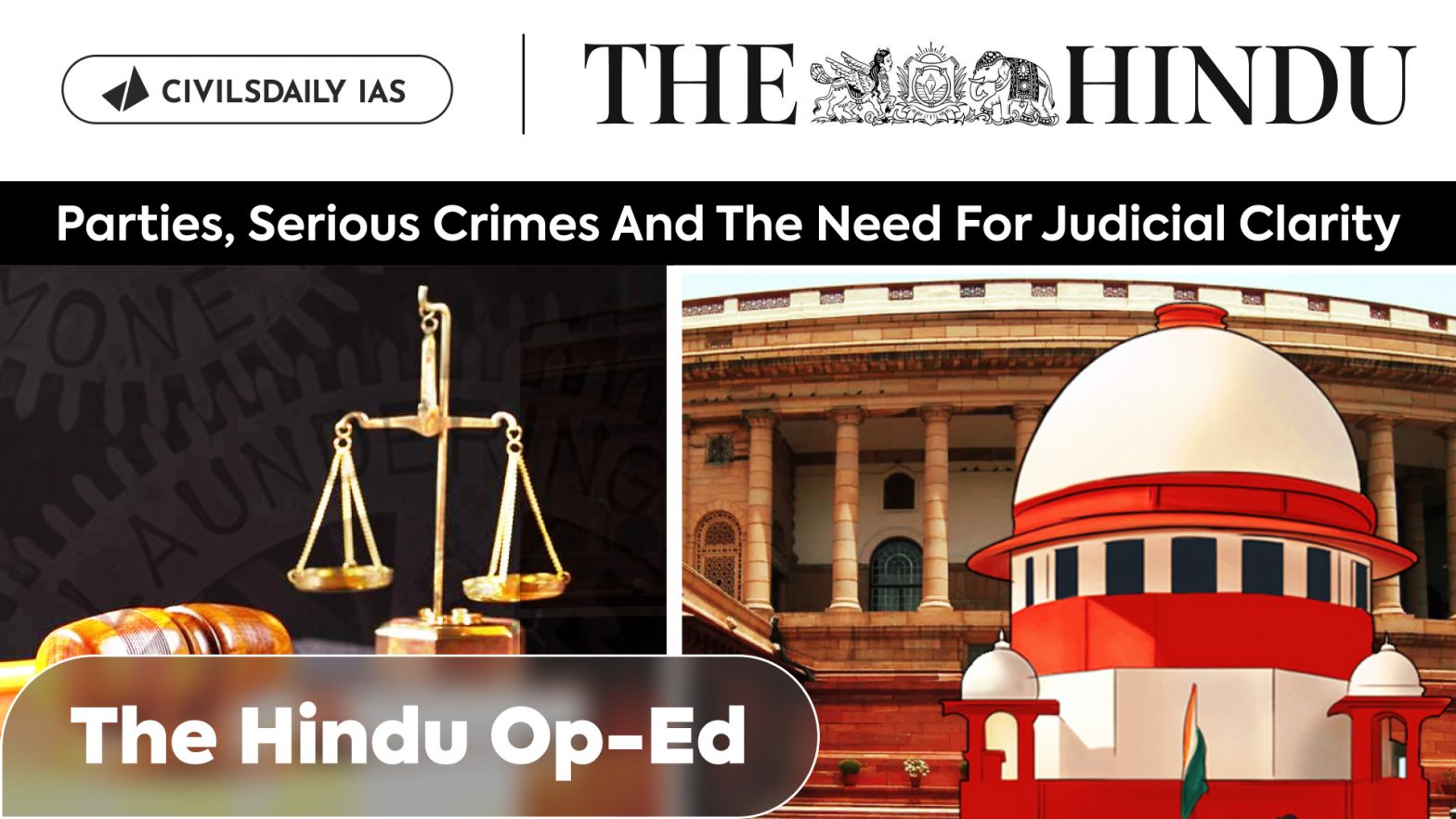| PYQ Relevance:Mains: Q) Money laundering poses a serious security threat to a country’s economic sovereignty. What is its significance for India and what steps are required to be taken to control this menace? (2013) Q) Discuss how emerging technologies and globalisation contribute to money laundering. Elaborate measures to tackle the problem of money laundering both at national and international levels. (2021) |
Note4Students:
Mains: Issues related to Section 70 of the PMLA;
Mentor comments: Two recent Supreme Court observations in the bail petitions of Delhi CM Arvind Kejriwal and ex-Deputy CM Manish Sisodia highlight significant legal issues. Justice Sanjiv Khanna’s Bench questioned the role of the Aam Aadmi Party (AAP) in a PMLA case involving its leaders, asking if the party itself could be made an accused. This led the Enforcement Directorate to include AAP as an accused in Mr. Kejriwal’s case, marking the first time a political party is implicated under PMLA. This raises serious concerns given the pivotal role of parties in a parliamentary democracy.
Let’s learn!
—
Why in the News?
Two Supreme Court Benches questioned the role of political parties under the PMLA, leading to AAP being accused, which raises important constitutional issues.
| About PMLA: The Prevention of Money Laundering Act, 2002 (PMLA) is a significant piece of legislation in India aimed at combating money laundering and related financial crimes. Objectives: 1. The PMLA is designed to prevent the process of money laundering, which involves concealing the origins of illegally obtained money. 2. The Act provides for the confiscation of properties derived from or involved in money laundering activities.It establishes mechanisms for the detection and investigation of money laundering offenses. |
Issues related to Section 70 of the PMLA:
- Application of Section 70 of PMLA to Political Parties: The legal question arises whether political parties can be categorized under the definition of “company” or “association of individuals” as per Section 70 of the PMLA. The law typically applies to bodies corporate or firms, which are transactional entities, unlike political parties.
- Distinction in Definitions: Section 29A of the Representation of the People Act (RPA), 1951, defines a political party as an association of citizens that calls itself a political party. This specific designation creates a legal distinction between general associations of individuals and political parties, it means political parties may not be intended to fall under the scope of Section 70 of the PMLA.
- Ejusdem Generis Interpretation: The legal principle of ejusdem generis suggests that “association of individuals” under Section 70 should be interpreted as entities similar to bodies corporate or firms. Since political parties are not engaged in business or transactional activities like these entities, their inclusion under Section 70 is legally questionable.
Issues related to Policy and criminality
- Cabinet Decision-Making and Accountability: The cabinet, as the highest decision-making body in a parliamentary democracy, is collectively responsible for policy decisions. The judiciary typically does not examine the motives or correctness of cabinet policies, focusing instead on the process and legality. Charging individual ministers with criminality for collective cabinet decisions undermines the collective principle.
- Ivor Jennings’ View on Cabinet Role: Constitutional authority Ivor Jennings describes the cabinet as the “directing body of national policy,” emphasizing that it is accountable to the legislature and ultimately to the people, who can disapprove of policies through democratic processes.
- Policy vs. Criminality in Judicial Interpretation: The observation by the Bench in Mr. Sisodia’s case highlights the difficulty in drawing a line between policy decisions and criminal actions. Criminal charges against individual ministers for decisions made by the cabinet may disrupt the functioning of the cabinet and are legally unsustainable in a parliamentary democracy.
Way forward:
- Clarification through Legislative Amendment: To address the ambiguity surrounding the applicability of Section 70 of the PMLA to political parties, the legislature could consider amending the PMLA to explicitly clarify whether political parties fall under the definition of “association of individuals.” This would provide legal certainty and prevent potential misuse or misinterpretation of the law.
- Judicial Guidelines on Policy and Criminality: The judiciary could establish clear guidelines on the distinction between policy decisions made by the cabinet and criminal actions taken by individual ministers. These guidelines would help ensure that the cabinet’s collective responsibility is preserved while allowing for accountability in cases of individual misconduct that fall outside the scope of legitimate policy-making.

